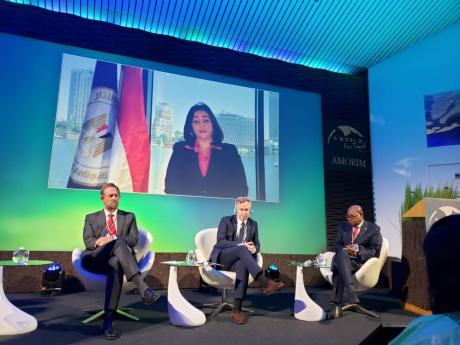Change your ways or be left behind, Bartlett warns tourism players
WESTERN BUREAU:
Destinations that fail to reorient themselves towards meeting the demands for sustainability are likely to be left behind, says Jamaica’s Tourism Minister Edmund Bartlett.
Speaking at a forum on sustainability at the Evora University in Portugal Thursday, Bartlett argued that the enormous macroeconomic impact of the tourism sector in the Caribbean justifies its designation as one of the industries in the region that is now considered “too big to fail”.
His comments came on the heels of a World Travel and Tourism Council assessment that the tourism economy is about 2.5 times larger than the tourism sector in the Caribbean. The tourism economy consists of various industries that feed into it, such as aviation, agriculture, power supply, water and manufacturing.
Overall, the indirect and induced contributions of tourism to economic output in the Caribbean is estimated to be three times the world average and considerably higher than those of other regions, stated Bartlett.
The tourism minister was keen on emphasising the need for greater commitment of all beneficiaries in the tourism value chain.
He called for the embracing and encouraging of changed behaviours among tourists, businesses, local communities and local economies with the objective of reducing the environmental and human health risks associated with many traditionally “ laissez-faire” tourism-related activities.
With the new thrust undoubtedly sustainable tourism, Bartlett told the gathering that it is anticipated that more international tourists will opt for “sustainable” destinations in the post-COVID era.
And the increased demand presents an opportunity for Caribbean destinations to identify and develop naturally suited niche markets such as eco-tourism, medical and health tourism, and culture and heritage tourism that promote the goals of responsible use of natural resources, protection and preservation of the cultural assets of host countries, he posited.
Bartlett said that strengthening local involvement and participation in the tourism value chain, while attracting new segments of the global tourism market was critical.
“Overall, sustainable tourism calls for the recovery process to be leveraged to improve the industry’s efficient use of energy and water, waste management, and sustainable sourcing of food,” he added.
It must be noted that the hospitality industry has traditionally recorded extremely high energy consumption levels for providing comfort and services to its guests, typically with a low level of energy-efficiency.
ACCELERATING THE SHIFT
The pandemic’s augmentation of the vulnerability of the tourism industry requires that industry players become more self-aware of how their actions contribute either negatively or positively to various outcomes, the tourism minister stated.
To this end, he said they must accelerate the shift to sustainable energy consumption and more efficient use of non-renewable resources to reduce carbon footprint, reverse the depletion of valuable ecosystems, cut operational costs and prepare for future problems such as power outages, oil-price volatility and water shortages.
Caribbean destinations must also place greater focus on addressing the historical constraints to economic empowerment of the tourism labour force, a statement he has made over time.
On Thursday, he reiterated that while there is no doubt that tourism in the Caribbean stimulates high levels of employment, both directly and indirectly, the quality of jobs created in the sector has come under sharp scrutiny.
Currently, the hospitality sector has to contend with negative perceptions of low wages and the lack of career opportunities beyond entry-level jobs, he shared.
Bartlett, who is also co-founder of the Global Tourism Resilience and Crisis Management Centre, said the competitiveness of the tourism industry in the region will depend on the extent to which destinations emphasise workforce-development strategies that are introduced in partnership with the both public and private institutions to provide formal qualifications and skills development in the emerging areas that will shape the future of the industry.

